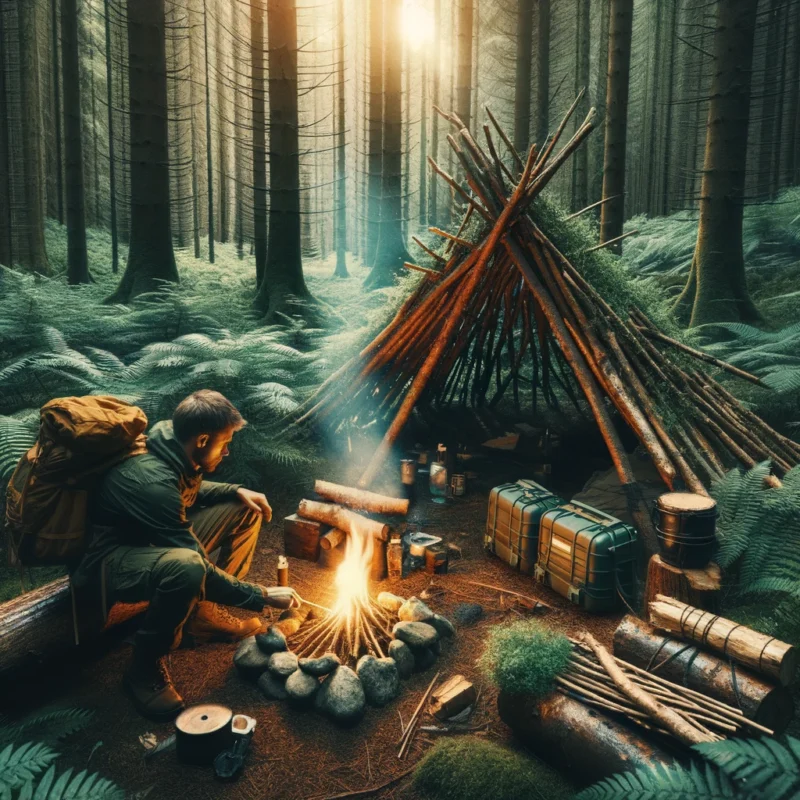Survival, Uncategorized
Essential Survival Skills for Your Next Outdoor Adventure
Introduction Venturing into the great outdoors offers not just the thrill of adventure but also the call of the wild, where being prepared is not just a choice, it’s a necessity. In the wilderness, survival skills are as essential as your backpack. Whether you’re planning a brief hiking trip or an extended expedition, understanding and mastering these skills can make a significant difference in unexpected situations. This guide covers fundamental survival skills that every outdoor enthusiast should know.
1. Basic Wilderness Survival: The Fundamentals Before setting out into the wild, it’s crucial to know the basics of wilderness survival. The core pillars include finding water, building a shelter, and starting a fire. Water is your most critical need in the wilderness, so knowing how to locate and purify water sources is paramount. Shelter-building, using natural materials or a simple tarp, can protect you from the elements and preserve your body heat. Fire is not just a source of warmth; it’s also essential for cooking, purifying water, and signaling for help. Mastering these skills can significantly increase your chances of survival in unforeseen situations.
2. Foraging and Hunting: Living off the Land In extended survival scenarios, finding food becomes crucial. Foraging for edible plants, berries, nuts, and insects can be a reliable food source. It’s essential to know which plants are safe to eat, as some can be poisonous. Basic hunting and fishing skills can also provide much-needed protein. Setting snares, fishing, and even simple hunting techniques can sustain you if you’re stranded for more than a few days. Remember, the key is to conserve energy and focus on easy-to-catch, high-calorie food sources.
3. First Aid and Self-Care in the Wild Accidents happen, and in the wilderness, being your own first responder is often necessary. Basic first aid knowledge, such as treating cuts, burns, and fractures, can be lifesaving. Equally important is the ability to recognize and handle common illnesses like dehydration, heatstroke, and hypothermia. A well-stocked first aid kit should be a part of your gear, equipped with essentials like bandages, antiseptic wipes, and pain relievers. Prevention is always better than cure, so plan ahead and be prepared for common injuries associated with your adventure.
4. Weather Awareness and Natural Hazard Preparedness Understanding and preparing for weather conditions is crucial for any outdoor adventure. Knowing how to read the sky for weather patterns, understanding wind direction, and preparing for sudden weather changes can keep you safe. Additionally, familiarize yourself with the natural hazards specific to your destination, such as flash floods, storms, or extreme temperatures. Learning how to create makeshift weather shelters and understanding the terrain can help you avoid or mitigate these natural risks.
5. Advanced Survival Techniques For those who venture deeper into the wilderness or find themselves in prolonged survival situations, more advanced skills can be crucial. Learning to make basic tools from natural materials can aid in tasks like food preparation or shelter building. Long-term shelter building, which involves creating more permanent structures, can be essential for extended stays in the wild. Beyond the physical skills, survival also has a mental and psychological component. Staying calm, maintaining a positive attitude, and using problem-solving skills can greatly impact your ability to cope with challenging situations. Developing these advanced skills requires practice and patience but can be incredibly rewarding and life-saving.
Conclusion Embarking on an outdoor adventure is a journey into the unknown, and being equipped with essential survival skills can make all the difference. From the fundamental necessities of water, shelter, and fire to the more advanced techniques of foraging, first aid, and mental resilience, these skills form the backbone of any successful outdoor endeavor. Whether you’re a seasoned explorer or a novice hiker, continuous learning and practice of these survival skills are vital. They not only prepare you for the challenges of the wilderness but also instill a deeper appreciation and respect for nature.
We’d love to hear your stories and tips on survival in the great outdoors. Which of these skills have you found most useful on your adventures? Do you have any personal experiences where these skills came in handy? Share your stories in the comments below and join our community of outdoor enthusiasts in promoting safe and responsible exploration of the wild.


